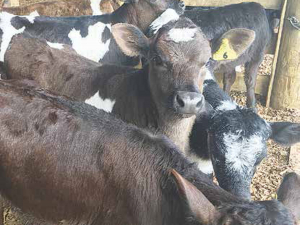Probiotics help calf rearing systems
Success in calf rearing is often measured by minimising health issues and achieving target weaning weights.
 Calves grown faster in the first few weeks of their life lay down better tissue in the developing udder, and milk better as heifers.
Calves grown faster in the first few weeks of their life lay down better tissue in the developing udder, and milk better as heifers.
Farmers are being urged to feed more milk to new-born calves.
Chris Collier, Probiotic Revolution, says this is based on research that shows that calves grown faster in the first few weeks of their life lay down better tissue in the developing udder, and milk better as heifers.
In a University of Illinois study, by initially growing calves faster, heifer milk an protein production increased by 10%.
Collier says Probiotic Revolution uses specific probiotics in Calf Xtreme that helps avoid nutritional scours and other health issues at the high rates of milk. Consequently calves just grow faster and with the product spilling into the rumen of calves, farmers are amazed at how much meal, hay or grass they eat after a couple of weeks, says Collier.
He says that one farmer who fed his calves 8 litres once a day, ran his heifers while out grazing with calves from two other family farms. They all had the same genetic base but at each weighing the 100 Calf Xtreme calves were a month ahead in liveweights compared with the other calves. There were no empties in these 100 calves, but 10 empties in the 150 calves not reared on the product.
Sick calves are also a nightmare and farmers know that when a calf is checked at a young age it does not perform well as a heifer.
"In times of stress or a disease challenge such as rotavirus we just doule the dose rate of Calf Xtreme," says Collier.
Crypto is more challenging and in addition to quadrupling the dose rate other control measures are needed. For coccidiosis a coccidiostat is needed.
Collier claims around 70,000 calves were reared on Probiotic Revolution's products last year and demand is expected to increase this year.
Tickets are now available for Beef + Lamb New Zealand’s (B+LNZ) Out the Gate, returning from 19-21 May 2026 at Te Pae, Christchurch.
Dairy Women's Network (DWN) is welcoming AgriHealth as a new partner.
Northland Field Days patron Ross Newlove remembers the inaugural field days he attended 40 years ago.
Southland farmer Murray Donald has been appointed as chair of Safer Farms, the industry-led organisation focused on reducing harm, injuries and fatalities in the agricultural sector.
National Lamb Day returns this Sunday, 15 February, with Beef + Lamb New Zealand Inc calling on Kiwis to fire up their barbecues and celebrate the people and the product that put New Zealand on the world map.
When it comes to arranging the sound system at Northland Field Days, no one does it better than Colin Finlayson.